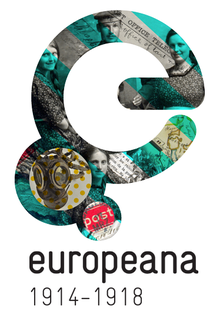Europeana 1914-1918
Europeana 1914–1918 is a web portal in which documents from the time of the First World War are made accessible to interested parties; these come from libraries , museums , film archives and from private individuals. The web portal is part of the Europeana cultural portal .
Since 2011, materials have been collected (selected, digitized and put online) in three projects:
- 400,000 documents from ten national libraries and other partners in eight countries,
- 660 hours of footage from 21 European film archives,
- Over 10,000 contributions that have been digitized in thirteen countries so far as part of campaign days (corresponds to over 100,000 scans).
The sources are intended to comprehensively document the reality of life between 1914 and 1918 on the war front and within the German Reich .
The themed portal was officially activated on January 29, 2014 by Minister of State for Culture Monika Grütters in the Berlin State Library . It represents the most comprehensive European collection of original documents on the First World War. To date, institutions and private individuals from over 20 European countries have contributed to the virtual collection.
Single projects
National Library Collections
As part of the Europeana Collections 1914–1918 project , ten national libraries and two other contributors in eight countries made around 400,000 sources from the First World War available online. Children's and school books, war cookbooks, edification pamphlets , personal letters and war postcards , diaries, photos, leaflets, pamphlets, maps and music, trench newspapers , entertainment literature for prisoners, practical survival guides for soldiers at the front and other sources primarily on everyday history were digitized. The focus was on special collections, i. H. on sources that are rare or only accessible in separate reading rooms in the libraries, e.g. B. manuscripts, works of art, plane drops, rare books and "gray literature" , maps, musical literature and books for children and young people.
The digitization project was coordinated by the Berlin State Library. It ran from 2011 to 2014 and was funded by the European Union . In March 2012 the first documents were made available on the Europeana website . The total costs were 5.4 million euros. The following were involved in the project:
- Berlin State Library (also coordination)
- Biblioteca Nazionale Centrale di Roma
- Biblioteca Nazionale Centrale di Firenze
- Bibliothèque nationale de France
- Bibliothèque nationale et universitaire de Strasbourg
- Bibliothèque Royale de Belgique - Koninklijke Bibliotheek van België
- British Library
- The congregational library
- Narodna biblioteka Srbije
- Austrian National Library
- Istituto Centrale per il Catalogo Unico delle biblioteche italiane
- Clio-online
In addition, the virtual exhibition Places of Transition and a multilingual e-learning website for schoolchildren and teachers were created, which were developed jointly by all project partners under the direction of the British Library. A film made as part of the project about the world war writer Walter Flex gives an insight into the digitization workshop of the Berlin State Library.
Film archives
In the European Film Gateway 1914 (EFG1914) project , over 700 hours of film material (around 3000 films) on the First World War were collected from more than 20 European film archives. The collection contains u. a. Newsreels , documentaries, feature, propaganda and anti-war films . Since only an estimated 20% of the films produced during the silent film era have survived to this day, the films digitized as part of the project represent an important tradition from this period.
Documents from private individuals
Since 2011, the crowdsourcing project Europeana 1914–1918 has been collecting previously unpublished private letters, photographs and other memorabilia from the time of the First World War, digitizing them and making them available online. It goes back to the “Great War Archive” initiative, which was launched in 2008 at Oxford University .
Until May 2014 people from 13 countries participated in the project. On over 130 “days of action”, private individuals were able to bring their memorabilia with them for digitization. Approx. 10,000 objects (equivalent to approx. 90,000 pages) were digitized and made searchable. The interested public still has the opportunity to digitize, describe and upload their own memorabilia themselves.
reception
Europeana 1914–1918 received national and international media coverage.
- Andreas Kilb wrote in the Frankfurter Allgemeine Zeitung : “The question of whether there will be a joint European commemoration of the outbreak of the Great War a hundred years ago has not yet been conclusively answered. (...) But there is a historical and political progress compared to the anniversaries ten, twenty or fifty years ago, and its stage is the Internet. "
- "The abundance of material that is now available on the Internet could give scientific research on the First World War decisive new impulses," said Sönke Neitzel at a Europeana conference in the Berlin State Library.
- Chancellor Angela Merkel rated Europeana 1914–1918 in her podcast on May 24, 2014 as a “very wonderful initiative, especially since it doesn't just refer to Germany, but also closes the rifts that existed at the time by simply also closing the gap can see digitized images from completely different European countries ” .
Web links
- Europeana 1914–1918 (common theme portal for all three projects)
- Topic portal of the crowdsourcing project
- Europeana Collections 1914-1918
- European Film Gateway 1914
Individual evidence
- ↑ "Places of Transition"
- ↑ World War One - British Library
- ↑ A digital memory for the First World War
- ↑ Europeana 1914-1918: add contribution
- ↑ Andreas Kilb: Field cap, head hose. Image commemoration: The First World War on the Internet. In: Frankfurter Allgemeine Zeitung, January 30, 2014
- ↑ Astrid Herbold: The private world war. In: Der Tagesspiegel, February 4, 2014
- ↑ Video podcast of the Federal Chancellor # 15/2014 from May 25, 2014 see here ; PDF see here
